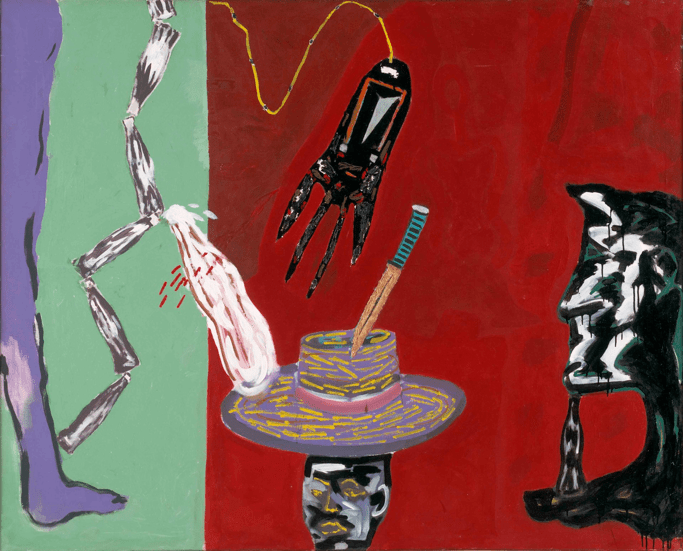The 1980s were a turbulent time throughout much of Europe.
Mass unemployment and the omnipresent threat of the atom bomb led to discontent and unruliness among young people, culminating in riots, demonstrations, and angry creative outpourings in both music and painting. Punk rock had shaken the world in the 1970s, and art movements like ‘Die Neue Wilden’ in Germany and ‘La Transavantgardia’ in Italy picked up the mantle and took it into the new decade.
The artists were inspired less by the old masters than by the world they lived in, although some of the early 20th century expressionists, like Chagall and the ‘Die Brucke’ group, as well as the New York action painters of the 1950s like Pollock and de Kooning, were clear influences.
In Denmark too, painting had its new wave. ‘De Unge Vilde’ (the wild youth) was the name given to a loosely structured group of young, expressionistic painters who first came to the nation’s attention with the group show, ‘Kniven på hovedet’ (the knife in the head) at the Tranegården gallery in Copenhagen’s respectable, northerly suburb of Gentofte in May 1982.
Provocative palette
The exhibition took its name from one of the exhibited paintings: Kehnet Nielsen’s disjointed collage of body parts. The separation of heads from bodies was seen as a metaphor representing the schism between the people and the world, as well as between body and soul. The exhibition was trying to search for a voice for a new generation lost in a soulless, callous society. The work was expressionistic, angry and provocative, and it stirred up a staid and sedate art world.
As individuals, De Unge Vilde comprised Berit Jensen, Nina Steen-Knudsen, Peter Bonde, Anette Abrahamsen, Dorte Dahlin, Steen Krarup, Kristian Dahlgård, Torben Christensen, Claus Carstensen and Kehnet Nielsen. At the time of the exhibition, they ranged in age from 24 to 39, and virtually all of them had been students at Copenhagen’s prestigious Royal Academy of Art between 1976 and 1982. Women may not have dominated the group, but they certainly had a clear voice, as there were four female painters amongst them.
Not just a domestic version of Berlin’s Die Neue Vilden, there were precedents in Denmark as well as in other parts of Europe. The ‘Eksskolen’ – an abbreviation for ‘Den Eksperimenterende Kunstskole’ (the experimenting art school) – started in 1961, and has been hugely influential on today’s art world.
It boasted respected artists like Richard Winther, Lene Adler Petersen, Ursula Reuter Christiansen and Poul Gernes (the man responsible for painting Copenhagen’s landmark cinema Palads in its eye-catching candy-striped colours in the late 1980s) amongst its teaching staff, and agent provocateur Bjørn Nørgaard and Per Kirkeby amongst its former student body.
Young and wild
The school was entrenched firmly in a ’60s consciousness, focusing heavily on ‘propaganda’ art media such as offset printing, text, graphics and poster art. There is no doubt that the use of texts daubed into painting, collage and mixed media by De Unge Vilde was something they had seen before during their art training. Aside from its end product, Eksskolen was also important as an example of a much more free, less academically entrenched form of creative education.
There were other important exhibitions, such as Aarhus Kunstmuseum’s ‘De Unge Vilde’ in 1983, as well as galleries that supported the individual artists with solo shows, such as galleries like Kunstforeningen Gammel Strand and Galleri Subset in Copenhagen and Galleri Specta in Aarhus. There was poetry in the form of Søren Ulrik Thomsen, film represented in Peter Bonde and Claus Carstensen’s experimental ‘In/Out the Flat no. 5’ and music in the shape of Peter Bonde’s avant-garde punk group Cyklon Anticyklon.
By 1985, the group had disbanded, with members going their separate ways. The message continued, however, filtering through into mainstream art’s consciousness. Almost all of the original members of De Unge Vilde became educators, many of them lecturing at the school they once studied in, the Royal Academy.
Possibly the best known was Claus Carstensen, 59, a multimedia artist who has managed to work his way into the establishment, even as he continued to have his spot there scrutinised and disputed, seen as both a master and a charlatan depending on the viewer’s perception. He worked at the academy from 1993-2002 and continues to exhibit to this day.
De Unge Vilde have become a little grey around the temples these days, but they still continue to keep the establishment in check with their own wry view of the world, influencing a whole new (and possibly tamer) generation.















